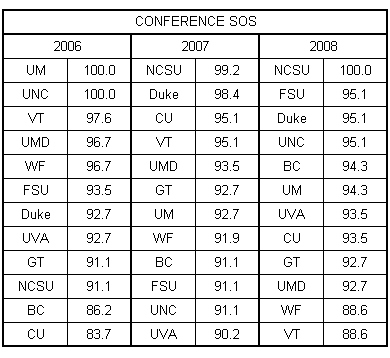The ACC’s total of 19 NCAA tournament wins from 2006 to ’08 is an all-time low for a three-year period since 1979-81, which was before the tournament expanded to 64 teams. The Big East, Pac-10 and Big Ten all play 18 conference games and got higher percentages of their members into the NCAA tournament in 2008.
The Charlotte Observer and the News and Observer ran the same article today stating, “amid concern over a lack of NCAA tournament at-large bids in two of the past three years, ACC athletics directors plan next month to discuss expanding the conference men’s basketball schedule to 18 games.”
The topic is very interesting and is something that we have discussed at length in the past. Everyone who visits this site MUST read THIS ENTRY for excellent detailed analysis on the ACC’s SOS issue.
Once you read that entry will you know as much or more than every single Athletics Director who will be sitting in that room next week. I am not exaggerating. Doesn’t that scare the hell out of you?
We typically hopes that the interests of the conference align with the interests of the majority member institutions. If the conference were to expand its regular season basketball schedule the result would most definitely be a benefit to NC State as the addition of two additional games on our schedule would usually serve to ‘dilute’ our top-heavy schedule that is created by our natural rivalries with Carolina and Wake Forest.
The chart below summarizes the SOS of just conference games over the last three years and is further explained in the entry that we previously linked. You will note that after Herb Sendek enjoyed the benefits of playing one of the weaker conference schedules in 2005-2006 that Coach Sidney Lowe has had the (mis)fortunate of competing against the most difficult conference schedule as would be possible.

The following quote from the article worth noting in any conversation about this topic:
Jerry Palm of collegerpi.com said his studies have shown that playing 18 conference games hurts a conference’s RPI. Palm is an expert on the RPI (Ratings Percentage Index), a formula that includes won-loss record and strength of schedule used by the Division I men’s basketball committee to compare candidates for the NCAA tournament.
“Going to two extra conference games has a general negative impact on RPI, because what usually happens is everybody takes two wins (over weaker opponents) off their schedule, so everybody’s overall record is lower,” Palm said.
I do not disagree with Palm’s general point. Howeer, in light of the conference’s dearth of tournament participants in recent years I wouldn’t find it particularly concerning for the ACC to drop a spot or two amongst conferences. On any average year the conference will generally amongst the top two or three in the country anyway…so what if we are 2nd instead of first? Obviously our perch at the top of the conference rankings hasn’t helped us earn more NCAA Tournament berths.
The extra game selfishly helps NC State disproportionately more than the rest of the conference because of the difficulty of our annual conference schedule which is skewed due to the strength of our natural rivals. The pool of teams that we don’t play twice is generally weaker than the pool of teams that other ACC teams don’t play twice. Therefore, adding two games to our conference schedule will – all else being equal – provide us a greater chance to win two additional games than it will other teams. The move will effectively reduce the variances of conference schedules.
Parting shot— do I even have to make a comment about the ONLY Athletics Director who was interviewed for this piece? Is it remotely a surprise to anyone that it took only two paragraphs to see those classic words,
“N.C. State athletics director Lee Fowler said”
Really? You don’t say? Lee Fowler had something to say about this? Wow.


